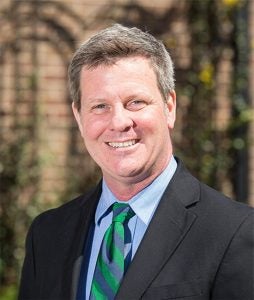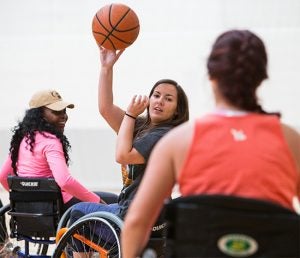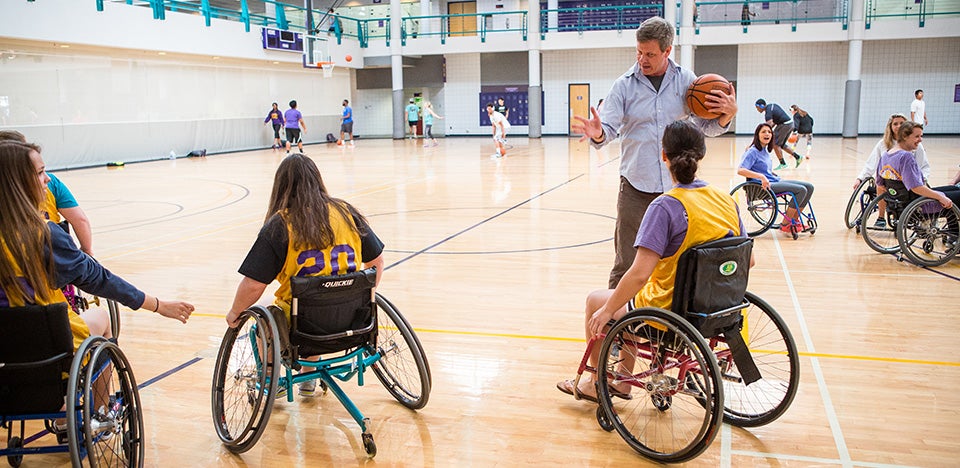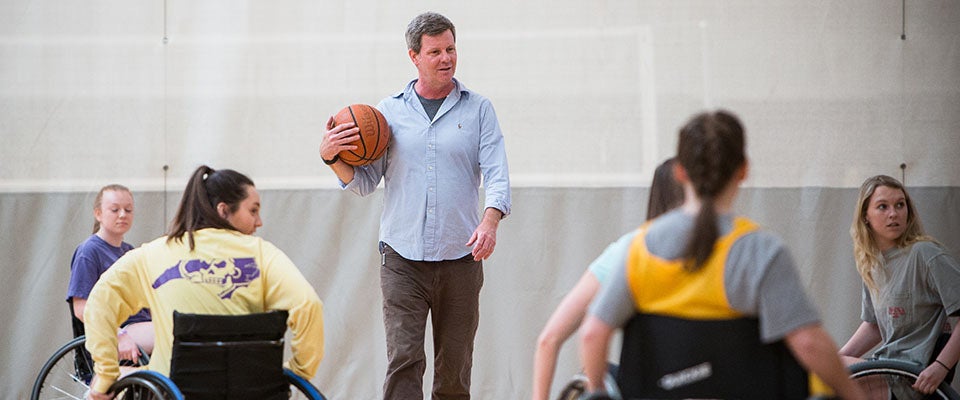CONTAGIOUS ENTHUSIASM
Recreation therapy professor honored for teaching excellence
Dr. Richard Williams, associate professor of recreational therapy, loves the subjects he teaches and wants his students to feel the same way.
His enthusiasm and his impact on East Carolina University students have earned him recognition from the University of North Carolina Board of Governors (BOG) in the form of an Award for Excellence in Teaching. The BOG recognizes one teacher annually from each of the 17 schools in the UNC system.
Williams will be honored during commencement exercises in May and will receive a $12,500 stipend and a bronze medallion.

Williams was chosen as ECU’s recipient of the 2016 Award for Excellence in Teaching, a recognition awarded annually by the UNC Board of Governors.
Dr. Matthew Mahar, chair of the Department of Recreation and Leisure Studies, said Williams is an outstanding teacher, presenter and storyteller.
“His presentations constantly grab the interest of the audience, have a logical flow and emphasize important concepts. It is obvious that Dr. Williams is well prepared and cares deeply about student learning,” Mahar said. “Dr. Williams’ willingness to share his personal emotions and experiences with his classes engenders a feeling of connectedness that students need to be intrinsically motivated to learn.”
Students agree that his passion is inspirational and ultimately motivated many of their own career aspirations.
“His passion and dedication for the recreational therapy field definitely influenced my work ethic,” said Kyle LaFlamme ’14, who is now a recreational therapist at a traumatic brain injury clinic. “He’s a prime example of someone who loves what he does for work.”
Williams said today’s teachers have strong competition for their students’ attention. With phones in their hands capable of researching obscure facts, as well as increasingly realistic video games and television, enthusiasm is essential for engagement.
“We’re holding our own; they’re still showing up in droves,” he said. “I try to find ways to make things interesting, surprising or cool. I am honest; I tell stories about myself, and encourage them to share stuff of their own, to laugh, make a wisecrack. If they haven’t had a little bit of fun, then it hasn’t been a very good class.”
Williams credited interesting subject matter and eager students for making his job fun.
“I teach the coolest stuff on earth – recreational therapy – so it’s an easy sale,” he said. “The students come to us already understanding that this is a helping profession; most of them have experience in their own lives or volunteering, working with people with disabilities. They’re very caring, they want to know the best way to approach things and they have interesting ideas of their own.”
He works to engage students in projects outside the classroom, including one class in which his students helped facilitate an adaptive waterski clinic for people with physical disabilities. One participant had a spinal cord injury, he said, and another had a brain injury from an assault while working in a prison.
“The students really embraced it,” he said. “We all cried together, we hugged, it was a great couple of days, and the participants got a lot out of it.”
In the lecture hall, he focuses on narrative.
“We evolved around campfires telling stories, and exaggerating the size of the wooly mammoth that got away. So students respond to that,” he said. “I want them to feel the same excitement I have for the subject by the end of the semester. I just try to change it up – humor, stories, videos – all very quick. They’re used to multitasking, they’re wired to be distracted, they like things to move.”
Stephany LaFlamme ’11 said that Williams’ anecdotes and interludes provided levity when the class was working through heavy or in-depth topics.
“It showed his students that he is human too, and it also gave us insight into the real world and what life will be like after school and as therapists,” she said.
Like her brother Kyle, Stephany is now working as a recreational therapist.
“He truly believes in our profession and it lights a fire in his students to be the same,” she said. “He wants each of his students to be successful and is willing to meet each of them where they are to do so. It’s not often you come across a professor who truly understands that each student learns at a different pace and in different ways.”

Students learn to play wheelchair basketball as part of Williams’ recreational therapy class.
Mahar said Williams’ work outside the classroom is just as exceptional. “He is an advisor for a high load of undergraduate students, serves on a large number of master’s thesis committees and is director of the recreational therapy bachelor’s degree program. The fact that graduate students consistently seek him out to either chair or serve on their thesis committees attests to his reputation of positively contributing to student learning,” he said.
Williams said that he was honored and surprised to be chosen for the Award for Excellence in Teaching. When he arrived at ECU, he found himself amongst a community of very good teachers.
“There’s this community of people who really throw themselves into the process of teaching,” Williams said. “It was this playground of a university where people were willing to try things, and the students were easy to get along with.
“So I’m really flattered to get this award at a university where I know there are so many good teachers. Even within my own unit there are people who care so much about teaching, talk about teaching and trade ideas all the time. So this really is home.”
The biggest reward in teaching, Williams said, is when students come to him years later and still recall his class or some discussion or topic that they covered.
“To this day, I maintain contact with him. He will always be a mentor to me, and for that I am grateful,” said Stephany LaFlamme. “Dr. Williams deserves this recognition for all of his hard work and dedication to the students at ECU. He is an amazing example of what it means to be a Pirate.”

Williams is known for being enthusiastic and engaging.
